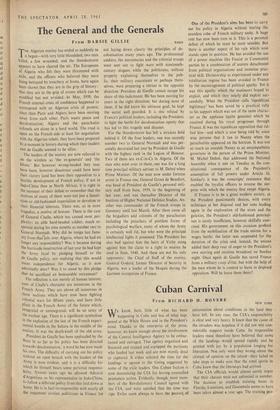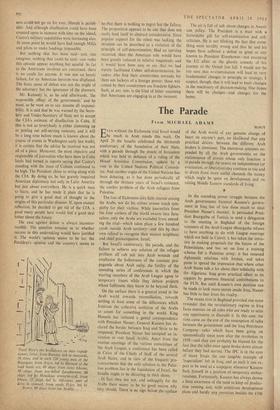Cuban Carnival
From RICHARD H. ROVERE
NEW YORK
WE know, here, little of what has been happening in Cuba and less of what hap- pened at the White House and in the President's mind. Thanks to the enterprise of the press, however, we know enough about the involvement of the Central Intelligence Agency to be embar- rassed and outraged. That agency organised and financed and trained and equipped the partisans who landed last week and are now mostly dead or captured. It either selected the time for the landings or agreed to the timing suggested by some of the exile leaders. One Cuban faction is now denouncing the CIA for having counselled premature action. Evidently, though. most mem- bers of the Revolutionary Council 'agreed with the .CIA, and were satisfied that the time was ripe. Exiles seem always to have the poorest. of information about conditions in the land they have left. In any case, the CIA's responsibility is clear and very heavy. It knew that the cause of the invaders was hopeless if it did not win con- siderable support inside Cuba. Its responsible leaders must therefore have believed that news of the landings would spread rapidly and be greeted with joy by a population longing for liberation. Not only were they wrong about the climate of opinion on the island—they failed to take steps to make sure that the rebel spirits in Cuba knew that the liberatqrs had arrived.
The CIA officials would almost surely argue that their choices were not unlimited in number. The decision to establish training bases in Florida, Louisiana, and Guatemala seems to have been taken almost a year ago., The training pro- cess could not go on forever. Morale is perish- able. And although disaffection could have been counted upon to increase with time on the island, Castro's military capabilities were increasing also. At some point he would have had enough MiGs and pilots to make landings impossible.
But nothing that has been said—and, one imagines, nothing that could be said--can make this episode appear anything but squalid So far as the Americans involved arc concerned. there is no credit for anyone. It was not an heroic failure, for no American heroism was displayed. The basic cause of defeat was not the might of the adversary but the ignorance of the planners.
Mr. Kennedy is, as he said afterwards, 'the responsible officer of the government,' and he must, as he went on to say. assume all responsi- bility. It is said that he was warned by the Secre- tary and Under-Secretary of State not to accept the CIA's estimate of disaffection in Cuba. If this is not so (everybody is either clamming up or putting out self-serving rumours, and it will be a long time before much is known about the course of events in Washington early last week), it is certain that the advice he received was not all of a piece. Moreover, the most objective and responsible of journalists who have been in Cuba lately had turned in reports saying that Castro's standing with the mass of Cubans continued to be high, The President chose to string along with the CIA. By doing so, he has gravely impaired American diplomacy not only in Latin America but just about everywhere. He is a quick man to learn, and he has made it plain that he is going to give a good deal of thought to the origins of this particular disaster. lf, upon mature reflection, he decided to get rid of the CIA, a good many people here would feel a good deal better about the future.
The case against defeat is always incontro- vertible. The question remains as to whether success in this undertaking would have justified it. The world's opinion seems to be no; the President's opinion and the country's seems to
'Psssti Here's the breakdown on their expedi- tummy force: from Boecnia, rich in vineyards, 50 ships, and in .ench 120 young men of the Boeotians; from Argos, led by Divined of the loud battle cry, 80 ships; from stony !thane, 30 ships; from low-hilled Lacedaenton, 60 ships; led by Menelaus, strong-in-zeal; front Ithaca, 12 ships, led by Odysseus, peer of Zeus in counsel; front sandy Pylos, led by Nestor, 90 ships; from fair Acadia . .
be that there is nothing to regret but the, failure. The proposition appears to be one that does not easily lend itself to abstract consideration. Since popular support for the rebels was lacking, the invasion can be described as a violation of the principle of self-determination. Had an uprising occurred. then the American role would have been greatly reduced in relative magnitude, and it would have been easy to say that we had merely facilitated Cuban self-determination.. In- vaders who find their countrymen unready for them are lackeys of a foreign power; those wel- comed by their countrymen are freedom fighters. Such, at any rate, is the kind of bitter reasoning that Americans are engaging in at the moment. The air is full of talk about changes in Ameri- can policy. The President is a man with a formidable gift for self-examination and self- criticism. He is not blinking the fact that some- thing went terribly wrong and that he and his hopes have suffered a defeat as great as any known to President Eisenhower—not excepting the U2 affair or the ghastly comedy of his journey to the Orient last fall. I would not be too sure that re-examination will lead to very fundamental changes in principle or strategy; I suspect, though, that it will lead to basic changes in the machinery of decision-making. One hopes there will be changes---and changes for the better.















































 Previous page
Previous page